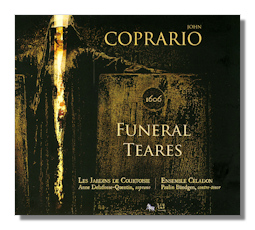
The Internet's Premier Classical Music Source
Related Links
- Coprario Reviews
- Latest Reviews
- More Reviews
-
By Composer
-
Collections
DVD & Blu-ray
Books
Concert Reviews
Articles/Interviews
Software
Audio
Search Amazon
Recommended Links
Site News
 CD Review
CD Review
Giovanni Coprario

aka "John Cooper"
- Songs of Mourning
- The Masques of Squires
- Funeral Teares
Anne Quentin, soprano
Paulin Bündgen, counter tenor
Florence Bolton, viola da gamba
Luc Gaugler, viola da gamba
Eleanor Lewis-Cloué, viola da gamba
Rémi Cassaigne, lute
Angélique Mauillon, harp
Ensemble Céladon
Les Jardins de Courtoisie
Zig-Zag Territories ZZT090302
John Cooper lived from about 1575 until 1626; this makes him a contemporary of Weelkes and Ferrabosco. He shared the preoccupation with melancholy of many late Elizabethan and Jacobean writers and musicians – not least Campion, Shakespeare and Dowland, some of whose "lighter" (!) works much of the music on this elegant and stylish CD resembles. Members of the ensembles, Les Jardins de Courtoisie and Ensemble Céladon (whose personnel overlap: we hear seven performers this time) here approach this music without a hint of maudlin, self-indulgence or histrionics. In so doing they have produced a faithful and idiomatic recital of music that could so easily have been distorted to fit a less profound and perhaps more public obsession from our own times with sadness and death.
Instead we have an hour of concentrated, expressive and pleasing music. Much of it has the quality of the miniature – no one work is longer than five and a half minutes and there is scarcely any sense of overblown drama, heroics in the face of doom or self-pity. Very little fast music: "O poor distracted" from Songs of Mourning [tr.9] is one of few items that works up a pace. But the performers have consistently managed to throw our attention onto the words and the instrumental lines, twists and textures in such a way that triteness never suggests itself; nor superficiality. At the same time, the tempi and phrasing never linger or dwell… however heavy the sentiment of the music.
That's not to say that the intent of John Cooper (or Giovanni Coprario, as he styled himself) was dishonest or over-demonstrative. In an analogous way to that in which the chorales in Bach's Passions offer a kind of balm in the face of tragedy, Coprario's musings on melancholy examine the nature not only of sadness and loss, but implicitly of how precious happiness is. As Burton, whose Anatomy of Melancholy was published in 1621, saw it, music was a "sovereign remedy". Les Jardins de Courtoisie, Ensemble Céladon and soloists do not, though, present these 21 songs from three collections as anything other than the purest music. Their singing style (phrasing, tempi, articulation) is never functional; always respectful.
The Masques of Squires stands as something of an exception, a "brief interlude" in the general experience of disease, war and general uncertainty about humankind's essence and position in an apparently expanding world all current at the outset of the seventeenth century. It's to capture "in print", so to put it, the strength of such sentiments (rather than hint at them in paint) that a somewhat matter-of-fact (though never perfunctory) tone has been adopted for this collection of five pieces by the performers on this CD, it seems. The less you protest, the greater the impact of your protestations. The other two groups of songs that surround it are not equivalent to a song cycle either. But there is an integrity to them which is well respected by the performers.
The musicianship is indeed excellent: Anne Delafosse-Quentin, for example, has a clear and arresting voice in the way of a young Emma Kirkby. The instrumentalists are closely recorded and can bear every note of our attention; they have a freedom (a lilt, almost – as in "Oh, les espoirs incertains des hommes" [tr.17]) and confidence that only adds to our sense of being led attentively through, rather than "exposed" to, the melancholy. This is in large part also due to the use of the lute, bass viol and harp as accompanying instruments. Some other accompaniment was specially written for certain of the pieces; it works well. The pronunciation of Jacobean English was "reconstructed" with the help of a specialist, and reflects the presumed French coloring.
The sound quality, then, is excellent. The booklet (although mis-stapled in the copy received for review) contains the texts in English and French and a useful short essay on the background by Quentin and Bündgen. More on the artists would have been welcome. If highly-focused (yet far from "hothouse") Renaissance song with all its intimacy and intensity appeals and if you demand a performance style that is at the same time urbane and as detached as appropriate without losing the atmosphere and import of the poetry and rhetoric, this CD will please. If you are unfamiliar with Coprario's work and/or want to investigate it sung as well as can be, then the same applies. Recommended.
Copyright © 2009 by Mark Sealey





















